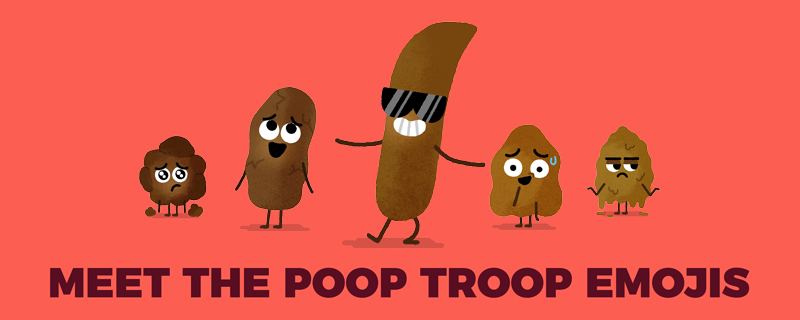
If you're a responsible user of emojis then you probably opt to include one of them in your texts rather sparingly. The smiling, bright-eyed pile of poop—one of the most popular among the 2,000 emojis available—is a statement piece that tends to be reserved for special occasions. It can be used in place of the common expletive, insinuate that things have gone in the metaphorical toilet or evoke passive-aggression. The poop emoji is also employed by some to articulate physical health, typically interpreted as "I feel like crap."
Recently, big pharma caught drift of this last one. In honor of Digestive Disease Week and to promote a new drug to treat chronic idiopathic constipation, Synergy Pharmaceuticals has unveiled the Poop Troop. The phone app, available to both iPhone and Android users, is a keyboard of highly nuanced poop emojis that provide cute animated visuals of the myriad shapes and consistencies of human feces. To evoke the problem of irregularity there's Stressed Out Stooly, Clogged Chris, Plugged Up Paulie and Left-Out Lumpy. One the other end of the spectrum one will find the company of Waterworks Willy, Runny Ron, Diarrhea Dave and Squirt. Of course, the guys we all want to get to know are the ones that symbolize regular bowel movements, which include Sausage Sally, Splasher Asher, Ploptastic Peter, Mr. Smooth and Miss La Poop.
The cast of characters are based on the Bristol Stool Chart, used by gastroenterologists and primary care physicians as a visual guide for patients to help assess bathroom habits and diagnose digestive problems. The stool scale was first proposed in 1997 in the Scandinavian Journal of Gastroenterology. Dr. Oz, once waxed poetic to Oprah Winfrey about qualities to look for when inspecting your number twos. "You want to hear what the poop sounds like when it hits the water. It should hit the water like a diver from Acapulco," America's favorite physician told Winfrey way back in 2005. "Pieces is bad. Plop, plop, plop."
Unfortunately, 12 to 19 percent of Americans hear that plop sound on a regular (or irregular) basis when they (finally) manage to perform on the can. This amounts to roughly 63 million people plagued by idiopathic constipation. Many people with chronic constipation also suffer from irritable bowel syndrome (IBS). Synergy's drug, Trulance (plecanatide), which the marketing campaign is tied to, was approved by the U.S. Food and Drug Administration in January 2017 to treat chronic idiopathic constipation. The company say the compound "works like a natural peptide in your body called uroguanylin." This peptide (and the medication) keep a person's elimination system running smoothly by regulating the amount of fluid in the intestines.
Synergy hopes the poop troop will provide a new way for constipation sufferers to "let your family, friends and doctor know what you're going through—both physically and emotionally."
For the most part, talking about one's bathroom habits—especially when they're not good— isn't particularly socially acceptable. But many people argue this is changing. There are some possible reasons why stool is increasingly a hot topic of conversation. It's not just the beloved poop emoji and all the swag it has inspired such as t-shirts, mugs, cupcakes and even a themed birthday party. There's a growing awareness and interest in the microbiome, the colony of good and bad bacteria that makes its home in the human gut and impacts a person's overall health. Unconventional medical treatments have piqued people's interest, such as fecal transplants, which are showing promise for a range of health conditions that previously seemed unrelated to the gut. The public is finally warming up to the idea that indeed your poo says a lot about you. It's not just a pile of s**t.
Uncommon Knowledge
Newsweek is committed to challenging conventional wisdom and finding connections in the search for common ground.
Newsweek is committed to challenging conventional wisdom and finding connections in the search for common ground.
About the writer
Jessica Firger is a staff writer at Newsweek, where she covers all things health. She previously worked as a health editor ... Read more
To read how Newsweek uses AI as a newsroom tool, Click here.






